Media Laws: Regulations and Ethics in Mass Media
VerifiedAdded on 2022/12/26
|7
|1203
|67
AI Summary
This project explores media laws, which are the regulations and ethical standards that govern mass media. It covers defamation law, including the defense of honest opinion, and privacy rights under the European Convention on Human Rights. The project also discusses the requirements for defense under defamation law and the criteria used by judges in privacy cases.
Contribute Materials
Your contribution can guide someone’s learning journey. Share your
documents today.
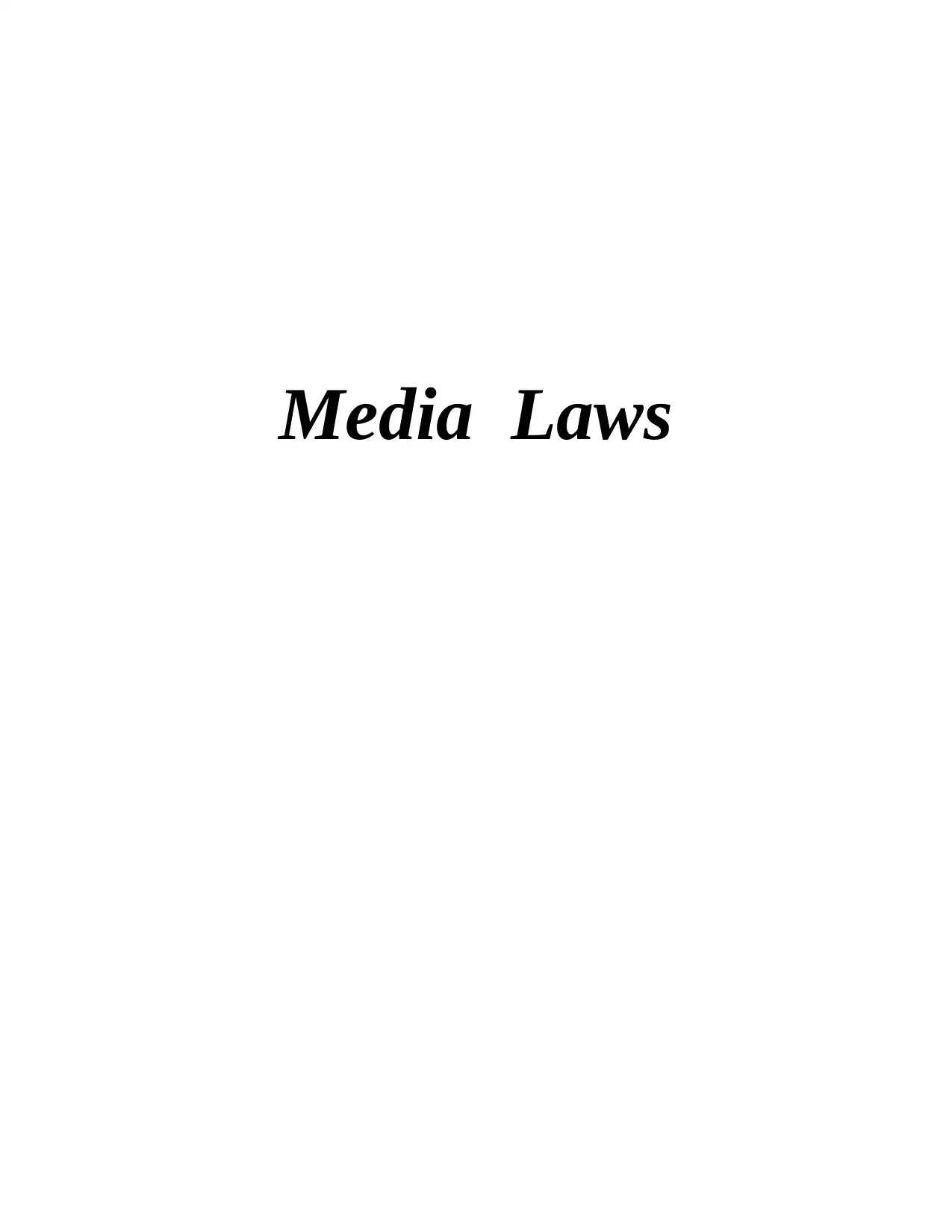
Media Laws
Secure Best Marks with AI Grader
Need help grading? Try our AI Grader for instant feedback on your assignments.
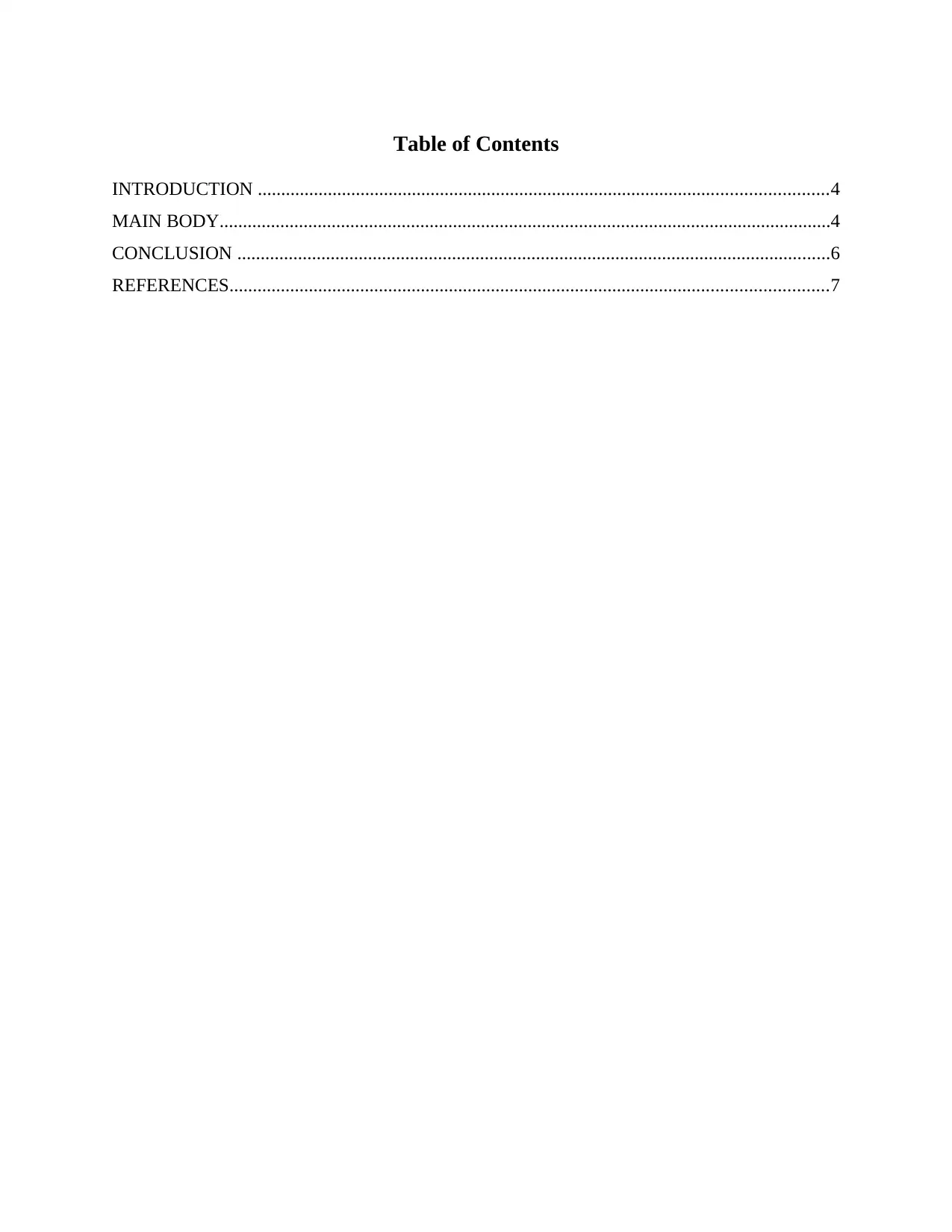
Table of Contents
INTRODUCTION ..........................................................................................................................4
MAIN BODY...................................................................................................................................4
CONCLUSION ...............................................................................................................................6
REFERENCES................................................................................................................................7
INTRODUCTION ..........................................................................................................................4
MAIN BODY...................................................................................................................................4
CONCLUSION ...............................................................................................................................6
REFERENCES................................................................................................................................7
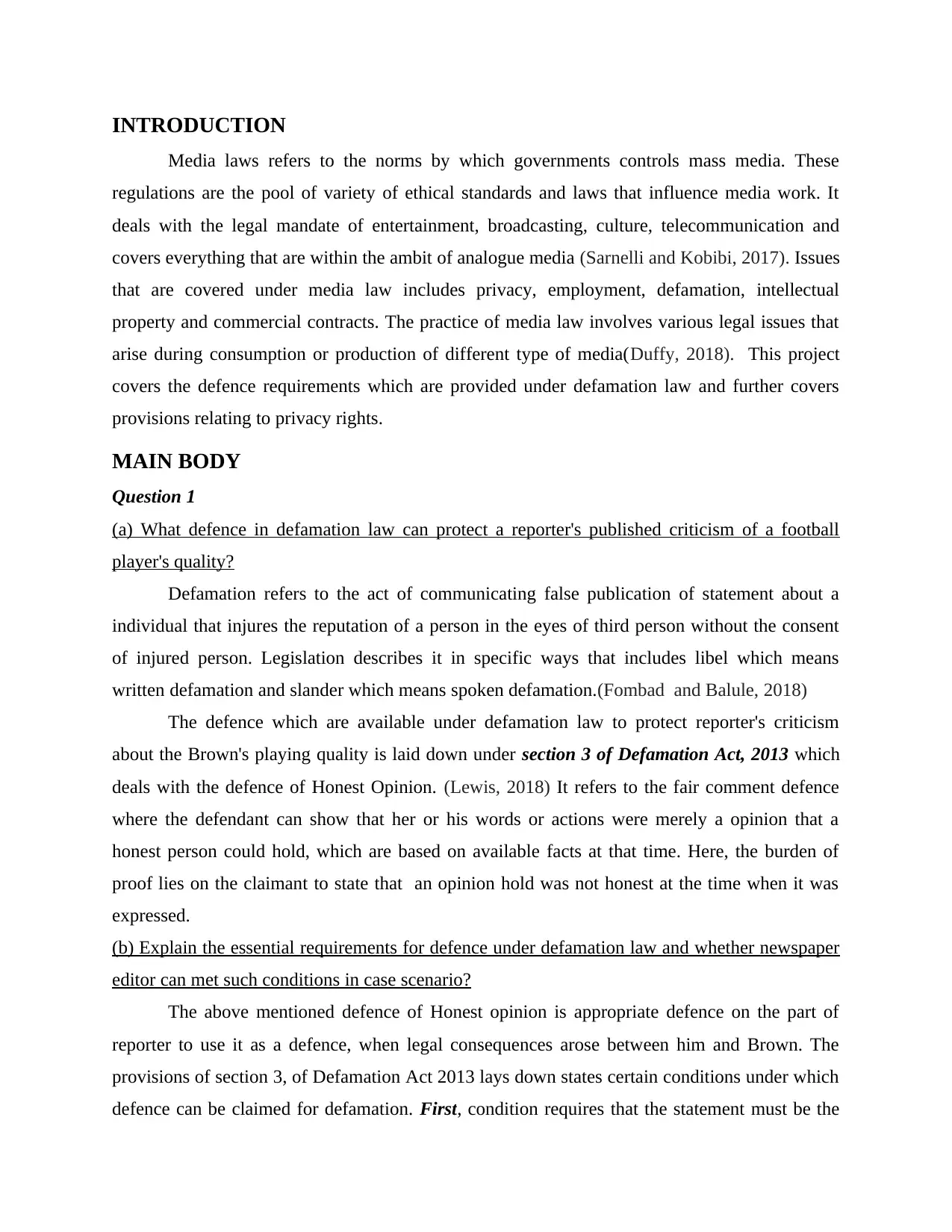
INTRODUCTION
Media laws refers to the norms by which governments controls mass media. These
regulations are the pool of variety of ethical standards and laws that influence media work. It
deals with the legal mandate of entertainment, broadcasting, culture, telecommunication and
covers everything that are within the ambit of analogue media (Sarnelli and Kobibi, 2017). Issues
that are covered under media law includes privacy, employment, defamation, intellectual
property and commercial contracts. The practice of media law involves various legal issues that
arise during consumption or production of different type of media(Duffy, 2018). This project
covers the defence requirements which are provided under defamation law and further covers
provisions relating to privacy rights.
MAIN BODY
Question 1
(a) What defence in defamation law can protect a reporter's published criticism of a football
player's quality?
Defamation refers to the act of communicating false publication of statement about a
individual that injures the reputation of a person in the eyes of third person without the consent
of injured person. Legislation describes it in specific ways that includes libel which means
written defamation and slander which means spoken defamation.(Fombad and Balule, 2018)
The defence which are available under defamation law to protect reporter's criticism
about the Brown's playing quality is laid down under section 3 of Defamation Act, 2013 which
deals with the defence of Honest Opinion. (Lewis, 2018) It refers to the fair comment defence
where the defendant can show that her or his words or actions were merely a opinion that a
honest person could hold, which are based on available facts at that time. Here, the burden of
proof lies on the claimant to state that an opinion hold was not honest at the time when it was
expressed.
(b) Explain the essential requirements for defence under defamation law and whether newspaper
editor can met such conditions in case scenario?
The above mentioned defence of Honest opinion is appropriate defence on the part of
reporter to use it as a defence, when legal consequences arose between him and Brown. The
provisions of section 3, of Defamation Act 2013 lays down states certain conditions under which
defence can be claimed for defamation. First, condition requires that the statement must be the
Media laws refers to the norms by which governments controls mass media. These
regulations are the pool of variety of ethical standards and laws that influence media work. It
deals with the legal mandate of entertainment, broadcasting, culture, telecommunication and
covers everything that are within the ambit of analogue media (Sarnelli and Kobibi, 2017). Issues
that are covered under media law includes privacy, employment, defamation, intellectual
property and commercial contracts. The practice of media law involves various legal issues that
arise during consumption or production of different type of media(Duffy, 2018). This project
covers the defence requirements which are provided under defamation law and further covers
provisions relating to privacy rights.
MAIN BODY
Question 1
(a) What defence in defamation law can protect a reporter's published criticism of a football
player's quality?
Defamation refers to the act of communicating false publication of statement about a
individual that injures the reputation of a person in the eyes of third person without the consent
of injured person. Legislation describes it in specific ways that includes libel which means
written defamation and slander which means spoken defamation.(Fombad and Balule, 2018)
The defence which are available under defamation law to protect reporter's criticism
about the Brown's playing quality is laid down under section 3 of Defamation Act, 2013 which
deals with the defence of Honest Opinion. (Lewis, 2018) It refers to the fair comment defence
where the defendant can show that her or his words or actions were merely a opinion that a
honest person could hold, which are based on available facts at that time. Here, the burden of
proof lies on the claimant to state that an opinion hold was not honest at the time when it was
expressed.
(b) Explain the essential requirements for defence under defamation law and whether newspaper
editor can met such conditions in case scenario?
The above mentioned defence of Honest opinion is appropriate defence on the part of
reporter to use it as a defence, when legal consequences arose between him and Brown. The
provisions of section 3, of Defamation Act 2013 lays down states certain conditions under which
defence can be claimed for defamation. First, condition requires that the statement must be the
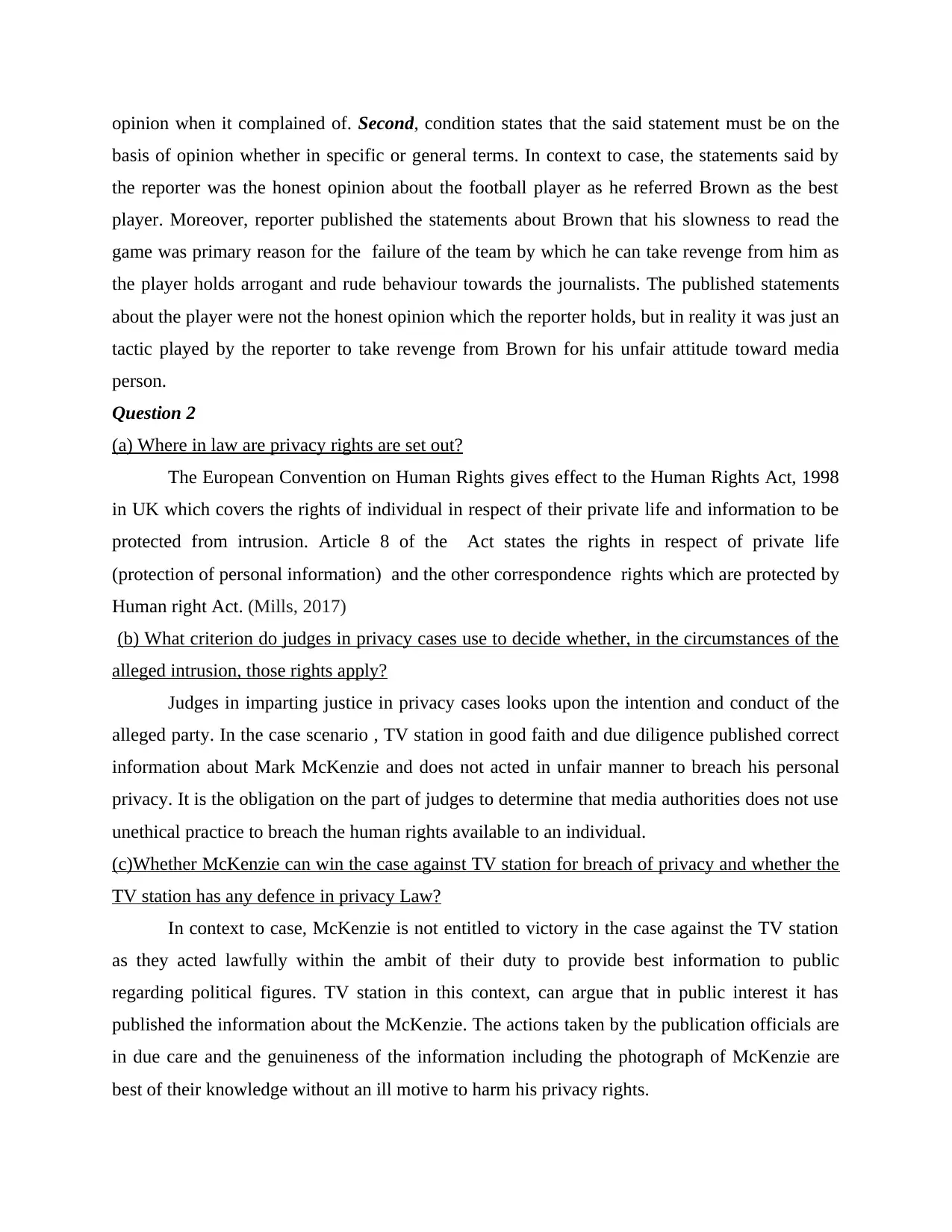
opinion when it complained of. Second, condition states that the said statement must be on the
basis of opinion whether in specific or general terms. In context to case, the statements said by
the reporter was the honest opinion about the football player as he referred Brown as the best
player. Moreover, reporter published the statements about Brown that his slowness to read the
game was primary reason for the failure of the team by which he can take revenge from him as
the player holds arrogant and rude behaviour towards the journalists. The published statements
about the player were not the honest opinion which the reporter holds, but in reality it was just an
tactic played by the reporter to take revenge from Brown for his unfair attitude toward media
person.
Question 2
(a) Where in law are privacy rights are set out?
The European Convention on Human Rights gives effect to the Human Rights Act, 1998
in UK which covers the rights of individual in respect of their private life and information to be
protected from intrusion. Article 8 of the Act states the rights in respect of private life
(protection of personal information) and the other correspondence rights which are protected by
Human right Act. (Mills, 2017)
(b) What criterion do judges in privacy cases use to decide whether, in the circumstances of the
alleged intrusion, those rights apply?
Judges in imparting justice in privacy cases looks upon the intention and conduct of the
alleged party. In the case scenario , TV station in good faith and due diligence published correct
information about Mark McKenzie and does not acted in unfair manner to breach his personal
privacy. It is the obligation on the part of judges to determine that media authorities does not use
unethical practice to breach the human rights available to an individual.
(c)Whether McKenzie can win the case against TV station for breach of privacy and whether the
TV station has any defence in privacy Law?
In context to case, McKenzie is not entitled to victory in the case against the TV station
as they acted lawfully within the ambit of their duty to provide best information to public
regarding political figures. TV station in this context, can argue that in public interest it has
published the information about the McKenzie. The actions taken by the publication officials are
in due care and the genuineness of the information including the photograph of McKenzie are
best of their knowledge without an ill motive to harm his privacy rights.
basis of opinion whether in specific or general terms. In context to case, the statements said by
the reporter was the honest opinion about the football player as he referred Brown as the best
player. Moreover, reporter published the statements about Brown that his slowness to read the
game was primary reason for the failure of the team by which he can take revenge from him as
the player holds arrogant and rude behaviour towards the journalists. The published statements
about the player were not the honest opinion which the reporter holds, but in reality it was just an
tactic played by the reporter to take revenge from Brown for his unfair attitude toward media
person.
Question 2
(a) Where in law are privacy rights are set out?
The European Convention on Human Rights gives effect to the Human Rights Act, 1998
in UK which covers the rights of individual in respect of their private life and information to be
protected from intrusion. Article 8 of the Act states the rights in respect of private life
(protection of personal information) and the other correspondence rights which are protected by
Human right Act. (Mills, 2017)
(b) What criterion do judges in privacy cases use to decide whether, in the circumstances of the
alleged intrusion, those rights apply?
Judges in imparting justice in privacy cases looks upon the intention and conduct of the
alleged party. In the case scenario , TV station in good faith and due diligence published correct
information about Mark McKenzie and does not acted in unfair manner to breach his personal
privacy. It is the obligation on the part of judges to determine that media authorities does not use
unethical practice to breach the human rights available to an individual.
(c)Whether McKenzie can win the case against TV station for breach of privacy and whether the
TV station has any defence in privacy Law?
In context to case, McKenzie is not entitled to victory in the case against the TV station
as they acted lawfully within the ambit of their duty to provide best information to public
regarding political figures. TV station in this context, can argue that in public interest it has
published the information about the McKenzie. The actions taken by the publication officials are
in due care and the genuineness of the information including the photograph of McKenzie are
best of their knowledge without an ill motive to harm his privacy rights.
Secure Best Marks with AI Grader
Need help grading? Try our AI Grader for instant feedback on your assignments.
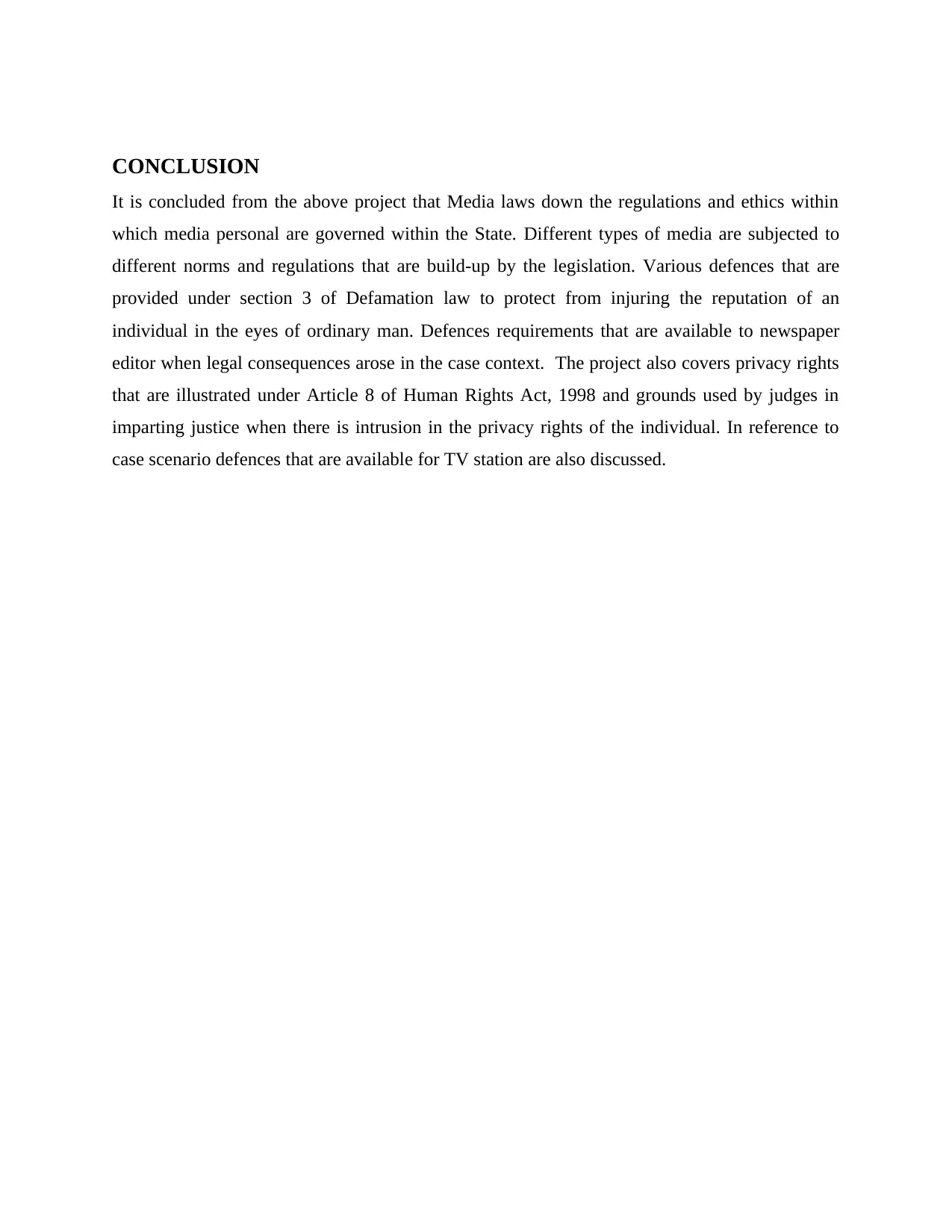
CONCLUSION
It is concluded from the above project that Media laws down the regulations and ethics within
which media personal are governed within the State. Different types of media are subjected to
different norms and regulations that are build-up by the legislation. Various defences that are
provided under section 3 of Defamation law to protect from injuring the reputation of an
individual in the eyes of ordinary man. Defences requirements that are available to newspaper
editor when legal consequences arose in the case context. The project also covers privacy rights
that are illustrated under Article 8 of Human Rights Act, 1998 and grounds used by judges in
imparting justice when there is intrusion in the privacy rights of the individual. In reference to
case scenario defences that are available for TV station are also discussed.
It is concluded from the above project that Media laws down the regulations and ethics within
which media personal are governed within the State. Different types of media are subjected to
different norms and regulations that are build-up by the legislation. Various defences that are
provided under section 3 of Defamation law to protect from injuring the reputation of an
individual in the eyes of ordinary man. Defences requirements that are available to newspaper
editor when legal consequences arose in the case context. The project also covers privacy rights
that are illustrated under Article 8 of Human Rights Act, 1998 and grounds used by judges in
imparting justice when there is intrusion in the privacy rights of the individual. In reference to
case scenario defences that are available for TV station are also discussed.
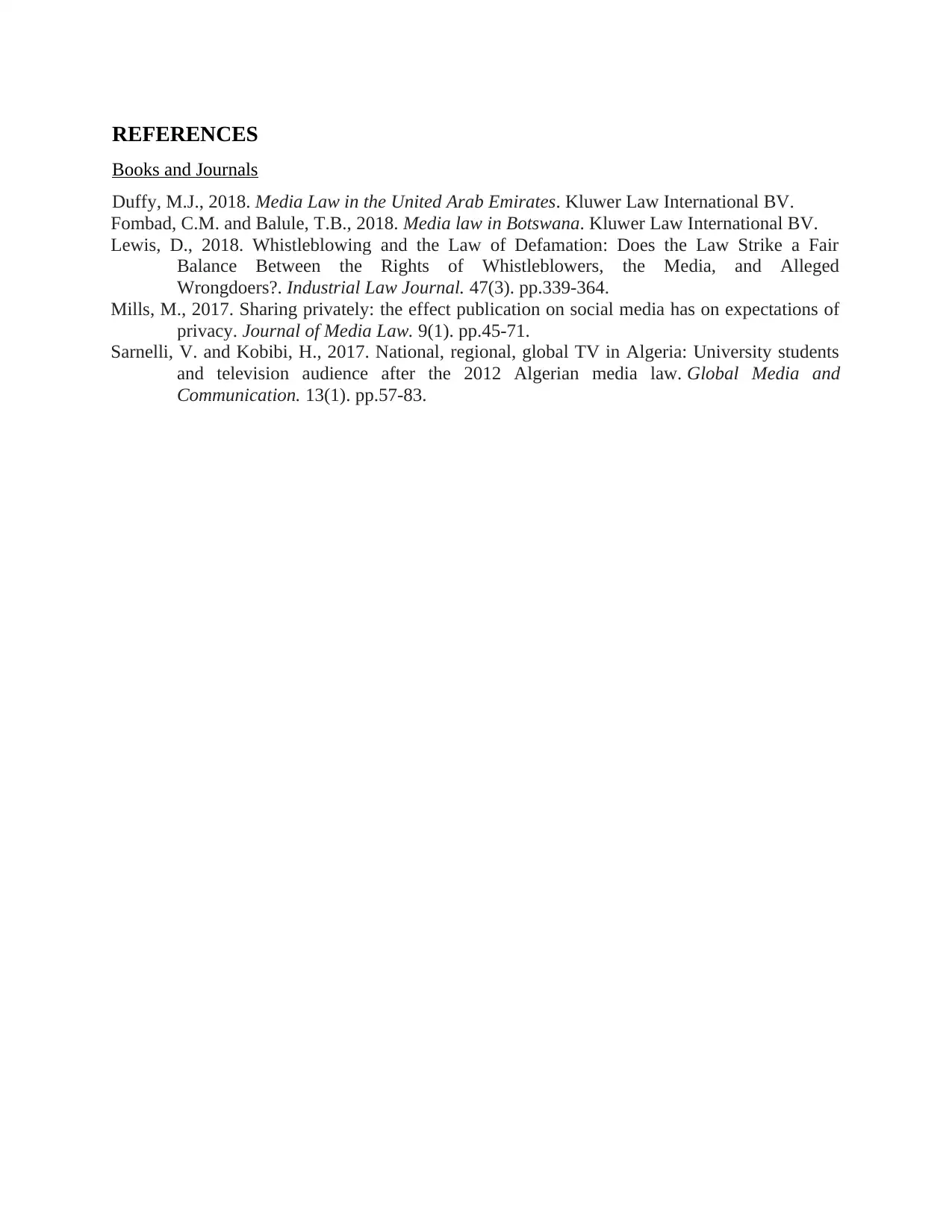
REFERENCES
Books and Journals
Duffy, M.J., 2018. Media Law in the United Arab Emirates. Kluwer Law International BV.
Fombad, C.M. and Balule, T.B., 2018. Media law in Botswana. Kluwer Law International BV.
Lewis, D., 2018. Whistleblowing and the Law of Defamation: Does the Law Strike a Fair
Balance Between the Rights of Whistleblowers, the Media, and Alleged
Wrongdoers?. Industrial Law Journal. 47(3). pp.339-364.
Mills, M., 2017. Sharing privately: the effect publication on social media has on expectations of
privacy. Journal of Media Law. 9(1). pp.45-71.
Sarnelli, V. and Kobibi, H., 2017. National, regional, global TV in Algeria: University students
and television audience after the 2012 Algerian media law. Global Media and
Communication. 13(1). pp.57-83.
Books and Journals
Duffy, M.J., 2018. Media Law in the United Arab Emirates. Kluwer Law International BV.
Fombad, C.M. and Balule, T.B., 2018. Media law in Botswana. Kluwer Law International BV.
Lewis, D., 2018. Whistleblowing and the Law of Defamation: Does the Law Strike a Fair
Balance Between the Rights of Whistleblowers, the Media, and Alleged
Wrongdoers?. Industrial Law Journal. 47(3). pp.339-364.
Mills, M., 2017. Sharing privately: the effect publication on social media has on expectations of
privacy. Journal of Media Law. 9(1). pp.45-71.
Sarnelli, V. and Kobibi, H., 2017. National, regional, global TV in Algeria: University students
and television audience after the 2012 Algerian media law. Global Media and
Communication. 13(1). pp.57-83.

1 out of 7
Related Documents
Your All-in-One AI-Powered Toolkit for Academic Success.
+13062052269
info@desklib.com
Available 24*7 on WhatsApp / Email
![[object Object]](/_next/static/media/star-bottom.7253800d.svg)
Unlock your academic potential
© 2024 | Zucol Services PVT LTD | All rights reserved.





